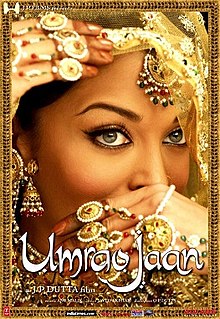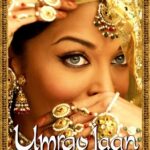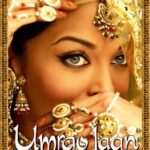Poochh Rahe Hai Song Lyrics and Translation
From the movie – Umrao Jaan 2006
Aarzoo thi humein ik naa
One wish is all I had
Zahe kismet miljaaye
And my life would be complete
Saari duniya mein kisi se to
In this whole world
Mohabbat mil jaaye
If only I had found some love/compassion
Jeeteji paaya na kuch humne zamaanewana
I have received nothing from the world all my life
Ab janaaze ko to rukhsat ki ijaazat mil jaaye
At least allow me to let my funeral procession pass
Pooch rahe hain
They are asking
Poochne waale
The people who are asking
Pooch rahe hain
Poochne waale
Lekin hum batlaaye kya
But what should I tell them
Lekin hum batlaaye kya
Daagh yeh dil ne paaye hain kaise
How my heart got these stains
Daagh yeh dil ne paaye hain kaise
Unko hum samjhaaye kya
How can I explain it to them
Unko hum samjhaaye kya
Pooch rahe hain
Poochne waale
Kitne daagh hai iss daaman mein
How many marks are there on my body
Kitne daagh hai maathe par
And on my head
Kitne daagh hai iss daaman mein
Kitne daagh hai maathe par
Jo humko apna sakte the
When those who could have kept me close didn�t
Sach hai humein apnaaye kya
Why should anyone else
Daagh yeh dil ne paaye hain kaise
Unko hum samjhaaye kya
Pooch rahe hain
Poochne waale
Jo apno ki gasti thi ab
She used to be among her own people
Nagari hai begaano ki
Now she is among strangers
Jo apno ki gasti thi ab
Nagari hai begaano ki
Kaun yahaan hai sun ne waala
Who here will listen though
Dil ki baat sunaaye kya
So what should I say about what my heart feels
Daagh yeh dil ne paaye hain kaise
Unko hum samjhaaye kya
Pooch rahe hain
Poochne waale
Patthar ab kya phaik rahe ho
You throw stones at me
Hum pehle se zakhmi hai
I am already injured
Patthar ab kya phaik rahe ho
Hum pehle se zakhmi hai
Dil par kitne zakhm lage hain
The amount of wounds on my heart
Chhoro tumhe ginwaaye kya
Forget it, how can I make you count them
Daagh yeh dil ne paaye hain kaise
Unko hum samjhaaye kya
Pooch rahe hain
Poochne waale
About the movie – Umrao Jaan 2006

J.P. Dutta’s adaption of the Urdu novel “Umrao Jan Ada” by Mirza Haadi Ruswa (1905).




